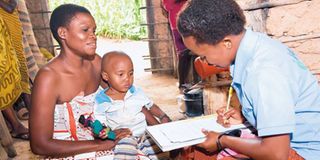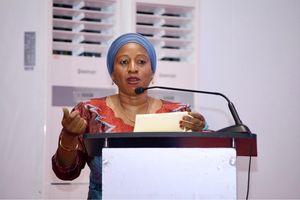This is Asha’s journey to a healthy motherhood

A community mobiliser counseling a society member.PHOTO|COURTSEY
What you need to know:
- The 27-year-old single mother of two had just received a three-month birth control injection, known as Depo-Provera.
- Before she met a community mobiliser who convinced her to try family planning, Asha’s way of avoiding unintended pregnancies was through unsafe abortion.
Clad in a pair of kanga, one piece wrapped around her waist and the other thrown loosely over her shoulders, *Asha Muneme, recently sat at a verandah outside the Mbagala Round Table Health Centre in Mbagala Kizuiani, Dar es Saalam as she breastfed her three-month-old daughter.
The 27-year-old single mother of two had just received a three-month birth control injection, known as Depo-Provera.
Before she met a community mobiliser who convinced her to try family planning, Asha’s way of avoiding unintended pregnancies was through unsafe abortion.
In January last year, Asha terminated a three-month pregnancy and another two-month pregnancy in April. A few months later, she conceived again and decided to keep the baby, this time because her boyfriend had promised to marry her.
“I have finally decided to use contraception because I do not want to get unintended pregnancy or engage in unsafe abortions anymore,” Asha says.
What brought the change
Asha is one among the many women who are benefitting from the services provided by community mobilisers in her area, thanks to efforts by Pathfinder International, a global organisation that focuses on reproductive health, family planning, HIV/AIDS prevention and care, and maternal health.
Ms Wema Moyo, a Technical Community Programme Advisor at the organisation, says that women such as Asha are being counseled by trained community mobilisers on the importance of family planning and where to access services.
Working under the ‘Chaguo la Maisha’ programme, the mobilisers go door to door, educating the women on the importance of getting post-abortion care. Then, the women are empowered to make life choices.
“[This] is all about planning your life, deciding the number of children to have…deciding the kind of life you want,” says Wema as she explains to Your Health how women can improve their lives through family planning.
The initiative also targets youth; who are encouraged to take up contraception and through this, they can be referred to the nearest health facility for further counseling and service.
According to Wema, community mobilisers encourage women who don’t plan to have children in a long time to use long acting methods such as implants and the intrauterine device (IUCD).
“There is no need to use short term methods for four to six years. We encourage women to use long acting methods because they are the most effective birth control methods. Studies show that chances of getting unintended pregnancy are high when you use short term methods,” says Wema.
This is because it is easy to forget to take the pill or go back to the clinic for a jab or due to stock outs and many other reasons.
The bigger picture
An expert in family planning at the organisation, Dr Isihaka Mwandalima, says the main goal in providing such services is to increase access to quality contraceptive services and comprehensive post abortion care in public health facilities.
“We provide skills to health care providers on provision of different family planning methods and comprehensive post abortion care. We also support them with equipment to provide the services which most facilities did not have,” says Dr Isihaka.
So far, more than 1000 healthcare providers from 96 health facilities in Dar es Salaam have been trained on how to provide the services under the scheme.
“We also provide post-partum family planning services. These are the services after delivery. So immediately after delivery, a woman gets an implant or an IUCD,” Dr Isihaka tells Your Health.
He says this is very important because very few women return to the hospital for post-natal care and so missing the opportunity after delivery could be a problem.
Abortion vs contraception
A nurse at the Mbagala Rangi Tatu Hospital, Ms Hilda Timira, who has been trained as a family planning mentor says that more women who have been educated on the services are now using contraception.
In June for example, she says, 193 women were put on contraception immediately after delivery, which never used to be the case before.
The medical officer in charge of maternity at the hospital, Dr Adam Silas concedes saying that before the programme was introduced, family planning counseling after delivery was not as intensive as it is today. Women who get post abortion care are too given family planning counselling and services.
In the past, according to Dr Silas, after women received post abortion care, they would be advised to wait six months before they conceived again so as to get time to recover but they were never advised to use contraception to avoid pregnancy.
Dr Isihaka says post-abortion care protects women from infections that could lead to complications.
He says in 100 women who die from pregnancy related causes, 25 per cent die from unsafe abortions and that this could be due to infection, lack of equipment or due to unskilled providers.
“Training health providers will reduce these deaths,” he says adding that improving the quality of family planning services as well as post-abortion care will help avert maternal deaths.
It is estimated that 30 women die from pregnancy-related complications every day in Tanzania.
A 2013 Guttmacher Institute study shows that clandestine abortion is common in Tanzania and that it is a major contributor to maternal death and injury.
“The link to unintended pregnancy is also clear. In 2013, Tanzanian women just had over one million unintended pregnancies, 39 per cent of which ended in abortion.
Addressing the unmet need for contraception will reduce incidence of unintended pregnancy and thereby the need for abortion and the deaths and injuries that often follow unsafe procedures,” says Colette Rose, Senior
International Communications Manager at the US-based Guttmacher Institute.
The Guttmacher study found that an estimated 405,000 abortions were performed in the country in 2013.
It also found that an estimated 66,600 women received post abortion care in health facilities for complications resulting from unsafe abortions in 2013.
However, almost 100,000 women who experienced complications did not receive the medical attention they needed.
Colette says it is critical to ensure that all women who want to avoid pregnancy, including young unmarried women can get family planning counseling and choose from a full range of contraceptive methods.
It’s here that Dr Isihaka again says, “Our aim is to reach those who need the service and the need is high.”
Investing time in the youth
Recent data shows that 50 per cent of girls start engaging in sexual activity before age 17 while boys start at the age of 19.
In Dar es Salaam, 50 per cent of women of reproductive age are youth aged between 10 and 24 which is why Dr Isihaka says there is need to pay particular attention to the youth.
Mwanaidi Said, a community mobiliser in Mbagala Kizuiani says more youth would like to avoid unintended pregnancy.
Mwanaidi says in the past youth were against contraception use especially before one had children. Today that has changed. Mwanaidi says they prefer long-term methods since they don’t want to be seen at the family planning clinic more often.
“Young people hate meeting people they know at the clinic that’s why they prefer long term methods,’’ she says.
Seven days after a person she counsels receives family planning service, Mwanaidi usually checks on them for feedback on the quality of service they received. She then follows them up after 30 days to see how they are faring and later after 90 days.
*Not real name




